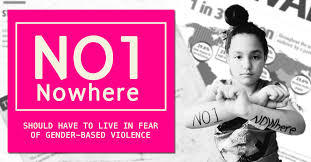On the approach to Mother's Day, there's the frivolous smell of flowers in the air, the spur of reservations abound and the light giggle of moms anticipating the bounties of Mother's Day. Restaurants displaying colorful graphics of luscious salads and decadent deserts color my drive around town, from school drop-offs to enrichment class pick-ups to soccer games and choir recitals. My three kids are very aware that Mother's Day is around the corner. They whisper plans and giggle about my impending surprise. 
This year as we are struggling through some of our own issues, my usual upbeat disposition has given way to an impending worry about the changes ahead. Still, my work for the many around the world whose struggles as mothers are far more dire than mine hasn't ceased. This year on my plate I have the fight to reverse the introduction of a bill in Iraqi parliament that would reduce the marriage age for girls to 9 (from its current legal limit of 18, though most Iraqi families have long abandoned that milestone), eliminate a consent requirement for sex within a marriage and impose a ban on the movement of women and girls from the confines of their homes without the permission of a male relative or guardian. Further, the law would place automatic custody in the hands of the father for any child over the age of 2, in the case of death or divorce. The law which is based on Jaafari jurisprudence from a 6th century Imam who thousands of years ago asked his Shiite followers to adopt these personal laws, is getting a great deal of attention as it is being implemented today in modern Iraq where women have long enjoyed civic rights well beyond those of 6th century jurisprudence. Three petitions in aggregate have garnered more than 600,000 signatures in protest to the adoption of this law and a new round of elections in Iraq is sure to bring renewed global scrutiny to this kind of reversal of rights. The proposed law in modern day terms is tantamount to state sanctioned child abuse, marital rape, false imprisonment and a complete recognition of paternal, versus maternal rights in cases of parental separation. It seems fitting that on this day before we, mothers in the West, celebrate a weekend highlighting our role as caretakers, nurturers and teachers to our children, we should be talking about a law that denies those very instincts.#no2Jaafarilaw 
Travel south one continent, and you will be in Africa, where just east of the Prime Meridian and north of the Equator, on a hot dry day in Nigeria last week, several hundred school girls were abducted and taken to their doom. Dead, you ask? No, worse -- confined to a life of servitude with multiple uncontrolled births as purchased wives to Boko Haram militants who fight by day and expect compliant service by night. While as a civilization we have evolved to a place where we frown on the idea of forced "comfort wives," who as we know them from previous world wars have grown old to tell their horrific stories, Boko Haram -- which means Western education is illegitimate -- still thinks of them as a necessity to keep up morale among their troops. Alarmingly, they further see girls who seek an education as their natural targets since they are "sullied" anyway by virtue of their quest for knowledge outside the Quran. Many of the girls will become pregnant. Many will die during childbirth, some will suffer a stillbirth and an ensuing fistula that will leave them incontinent and ostracized, most will never see their families again. While militant groups across the Middle East and Africa have long abducted girls for the oxymoronic purpose of "comfort women," this is the first time a massive international outcry has brought widespread attention to an ongoing scourge. Nigeria ihs osting a World Forum on Africa this year, and the impunity with which Boko Haram wreaks havoc on society is no longer an isolated Africa issue, but a matter of security for visiting dignitaries. Whatever the reason, we, as activist women in the international community, welcome the attention and the ensuing pressure it is exerting on governments to help quell the terror reigned by Boko Haram. #bringbackourgirls
Last month was Sexual Assault Awareness month and a coalition of organizations including Amnesty International, CARE, Futures Without Violence, and Women Thrive Worldwide started a campaign called "No 1, Nowhere" to bring attention to trafficking and sexual violence on women. The alarming statistic accepted worldwide is that 1 in 3 women will face sexual assault in their lifetime. That is an appalling statistic that should have everyone up in arms, but it does not. People read it, and then assume the numbers apply to a "they" or a "them" far away from an "us" or "we". But the women and girls that face this assault are everywhere. This is not a demographic based statistic, or one that focussed on education or socio-economic status. It is a broad average that applies to all women globally, and if we are lucky enough to be in a place where we don't think one of the two women standing on either side of us is likely to have been sexually assaulted, then we should look at a broader circle and wonder if in another community 10 out of 10 of the women would have been violently assaulted to make this statistic true. In fact, there are communities where a staggering two-thirds or more of the female population are systemically subjected to abuse and degradation. Some are trafficked - stolen away from their families and their communities and sold into forced labor of the very worst sort, which often involves physical labor and constant sexual assault - with no chance of parole. With a click and post of a picture using the hashtag #No1Nowhere, people everywhere can take part in the global howl against the assault, abuse and trafficking of women and girls. Across the world an estimated 800,000 women are trafficked across international borders while millions more are traded like cattle within their own borders. The web of corruption that enables the assaults and the trafficking is too broad for any one nation to tackle and often cronies in corrupt governments are hand-in-hand with the money trail that feeds the cycle. In other cases, as in Nigeria, they just look away because exploiting and degrading women is just business as usual. No 1 Nowhere is a call to end business as usual and demand that no person anywhere should live in fear of gender based violence. #no1nowhere
Here is the US, as women of an emancipated generation with a modern outlook on the life women can lead, we have entirely different struggles to stare down. Through the hard work of generations passed, we have attained the kind of equality that guarantees us legal rights and representation within government and on policy issues as well as in the workforce. We are educated, we dream big, we work hard, we climb ladders and we pat ourselves on the back. But we still have not shaken the stereotype of the woman as a "looker" first and a "thinker" second. The media, we are told, has a "woman problem." There are too few women opining about substantive issues like the economy, or public policy or foreign affairs. Instead, we are centered on fashion, family and beauty topics that are seen as "women's" topics. The larger social issues that plague the level playing field in our workforce, or the rise of women in substantial leadership positions go ignored, and most female journalists, we are told, concentrate on issues that are rarely covered on the "front page above the fold". I seethed as I read those reports knowing that I am focused on issues that affect the lives of women everywhere, and that I've never given a second glance to the fashions recommended by a style blogger, or the make-up marketed to me by lascivious looking women sprawled on glossy magazine pages attempting to convince that a shade of lip-gloss and the swish of eye shadow may miraculously turn the viewer into the woman staring suggestively off the page. Many young girls, however, do. They spend most of their time looking in the mirror and comparing themselves to the unattainable images on those pretty pages, selling products that come from companies who pay top dollar for advertisers to make them look beyond good. Seventy percent of adolescent girls think they are ugly or that they need to improve their looks. Many will resort to eating disorders in the desperate attempt to achieve that elusive goal. Most will buy products to help them look better, never realizing that they are buying into the proposition that their overarching goal in life should be to look perfect and attract attention, rather than to think about the real issues that shape their world. It is no wonder when they grow into the workforce as journalists, they focus on what they've been sold all their lives -- fashion and beauty, rather than the thornier issues that affect the world they live in: where a global population of 7 billion is busting at the seams and women around the world, who are being married off before they can learn to read, have multiple children they can't care for and would give life or limb just to have the same opportunities we have here in the West. A petition to urge advertisers to stop altering the images of women to an unattainable perfection has nearly twenty thousand signatures in less than a month from launch. #TruthInAds
People are paying attention. They are paying attention to laws that make child abuse and marital rape legal, they are paying attention to the wholesale abduction of girls in plain daylight for use as sex slaves in the modern day, they are paying attention to the sexual assault on women and the massive web of dirty profit the fuels human trafficking, and we - as mothers - are paying attention to the cunning of a generation into thinking that the gains of past feminists should be squandered in order to sell products. We all should pay attention that the gains made for women across the globe and here at home are held onto and protected for future generations to build on. #solvetheworldsproblems
